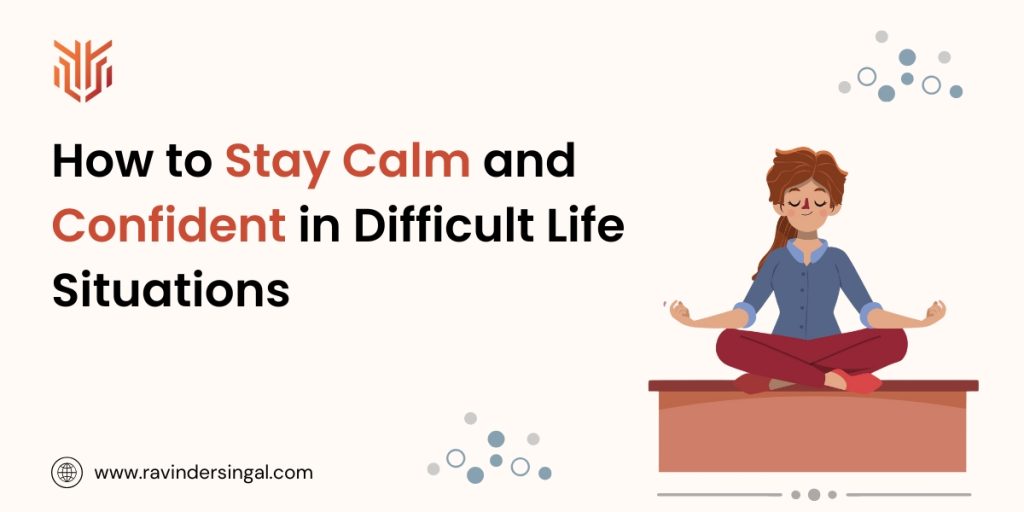How to Stay Calm and Confident in Difficult Life Situations

Life is a marathon, not a sprint, and along the way, we all encounter moments that test our strength, patience, and resolve. Whether it’s a personal crisis, a professional setback, or an unexpected challenge, difficult situations can shake our confidence and make us feel overwhelmed. But here’s the truth: you have the power to stay calm and confident, no matter what life throws at you. I, Dr. Ravinder Singal spent years inspiring individuals to tap into their inner resilience and face adversity with courage. In this blog, I’ll share practical strategies to help you stay calm and confident in difficult situations, drawing from my experiences and proven techniques that can transform how you navigate life’s toughest moments.
Understanding the Nature of Difficult Situations
Difficult situations often feel like storms – unpredictable, intense, and disorienting. They could be anything from financial struggles, health challenges, relationship conflicts, or high-pressure work environments. What makes these moments so daunting is not just the event itself but the emotional turbulence they trigger – fear, anxiety, self-doubt, or frustration. The good news? By mastering how to handle stress effectively, you can weather any storm with grace and poise.
The first step is to recognize that difficult situations are a natural part of life. They’re not here to break you but to shape you. Every challenge is an opportunity to grow, learn, and emerge stronger. With this mindset, you can shift from feeling like a victim to becoming the master of your circumstances.
How to Handle Stress Effectively in Tough Times
Stress is the body’s natural response to perceived threats, but when left unchecked, it can cloud your judgment and erode your confidence. Learning how to handle stress effectively is like equipping yourself with a shield against life’s challenges. Here are some actionable steps to manage stress:
- Pause and Breathe Deeply: When stress hits, your body goes into fight-or-flight mode. Counter this by taking slow, deep breaths. Inhale for four counts, hold for four, and exhale for six. This simple technique calms your nervous system and helps you regain control.
- Ground Yourself in the Present: Stress often stems from worrying about the future or ruminating on the past. Practice grounding techniques, like focusing on your senses – what you see, hear, or feel in the moment – to anchor yourself.
- Reframe the Situation: Instead of seeing a challenge as a threat, view it as a puzzle to solve. Ask yourself, “What can I learn from this?” or “How can I grow through this?” This shift in perspective reduces stress and boosts your problem-solving ability.
- Take Small, Intentional Actions: Overwhelm often comes from feeling like you have to solve everything at once. Break the situation into manageable steps and tackle them one at a time. Progress, no matter how small, builds momentum and confidence.
By incorporating these strategies, you can transform stress from an enemy into a manageable part of the process, allowing you to stay calm and confident in difficult situations.

Emotional Resilience Techniques to Build Inner Strength
Emotional resilience is your ability to bounce back from adversity and maintain balance no matter the circumstances. It’s like a muscle – the more you train it, the stronger it becomes. Here are some emotional resilience techniques to help you thrive in challenging times:
- Practice Self-Compassion: Be kind to yourself when things go wrong. Instead of harsh self-criticism, speak to yourself as you would a dear friend. Acknowledge your feelings without judgment and remind yourself that setbacks are universal.
- Build a Support Network: Surround yourself with positive, uplifting people who inspire and encourage you. Sharing your challenges with trusted friends or mentors can provide perspective and emotional relief.
- Reflect on Past Victories: Think back to times when you overcame obstacles. What strengths did you use? How did you grow? Reminding yourself of your resilience in the past can fuel your confidence in the present.
- Journal Your Thoughts: Writing down your feelings and experiences helps you process emotions and gain clarity. Try jotting down three things you’re grateful for each day to shift your focus toward positivity.
These techniques not only help you cope with challenging times but also empower you to face future difficulties with greater ease and confidence.
Coping with Challenging Times Through Mindfulness
Mindfulness is a powerful tool for staying composed under pressure. It’s about being fully present in the moment, without judgment or distraction. When you practice mindfulness during adversity, you create a mental space to respond thoughtfully rather than react impulsively. Here’s how to integrate mindfulness into your life:
- Start with Short Meditation Sessions: Dedicate 5–10 minutes daily to sit quietly and focus on your breath. Apps or guided meditations can help you get started. Over time, this practice enhances your ability to stay calm in high-pressure situations.
- Engage in Mindful Activities: Activities like walking, yoga, or even washing dishes can become mindfulness practices if done with full attention. Notice the sensations, sounds, and movements involved to anchor yourself in the present.
- Observe Your Thoughts Without Attachment: When negative thoughts arise, don’t fight them. Instead, observe them like clouds passing in the sky. This detachment reduces their emotional grip and helps you stay composed.
- Practice Gratitude: Even in tough times, there’s always something to be thankful for. A daily gratitude practice shifts your focus from what’s going wrong to what’s still right, fostering a sense of calm and optimism.
By weaving mindfulness into your routine, you’ll find it easier to manage anxiety in tough situations and maintain a steady, confident demeanor.
Building Inner Confidence to Face Life’s Challenges
Confidence isn’t something you’re born with – it’s something you build through intentional effort. Building inner confidence is like constructing a sturdy foundation for a house; it gives you stability no matter how fierce the storm. Here are some confidence-building strategies for life challenges:
- Set Realistic Goals: Break your challenges into smaller, achievable goals. Each success, no matter how minor, reinforces your belief in your abilities.
- Celebrate Your Strengths: Take stock of your unique skills, talents, and qualities. Write them down and revisit this list when self-doubt creeps in. Knowing your strengths helps you approach difficulties with assurance.
- Visualize Success: Before tackling a tough situation, close your eyes and imagine yourself handling it with calm and competence. Visualization primes your mind for success and boosts your confidence.
- Step Outside Your Comfort Zone: Confidence grows when you push your limits. Take on small challenges that scare you, whether it’s speaking up in a meeting or trying something new. Each bold step strengthens your self-belief.
- Learn from Failure: Failure isn’t the opposite of success; it’s part of it. When things don’t go as planned, analyze what went wrong, adjust your approach, and try again. This growth mindset fuels lasting confidence.
By consistently applying these strategies, you’ll develop a deep well of inner confidence that sustains you through any challenge.

Staying Composed Under Pressure with Mental Strength
Staying composed under pressure requires developing mental strength, which is the ability to regulate your emotions, thoughts, and behaviors in high-stakes situations. Mental strength doesn’t mean suppressing your feelings; it means channeling them constructively. Here’s how to cultivate it:
- Train Your Mind Like a Muscle: Just as you’d lift weights to build physical strength, practice mental exercises like visualization, affirmations, or problem-solving to sharpen your mind.
- Focus on What You Can Control: In any difficult situation, there are things you can influence and things you can’t. Direct your energy toward what’s within your control, such as your attitude, effort, or response, and let go of the rest.
- Develop a Routine: Consistency breeds strength. Establish daily habits – like exercise, meditation, or reading – that keep your mind sharp and resilient, even under pressure.
- Embrace Discomfort: Mental strength grows when you face discomfort head-on. Whether it’s a tough conversation or a daunting task, lean into the challenge rather than avoiding it.
These practices help you manage anxiety in tough situations and maintain a calm, confident presence, no matter the circumstances.
Positive Thinking in Hard Times: A Game-Changer
Your thoughts shape your reality, especially in difficult times. Positive thinking in hard times doesn’t mean ignoring reality or pretending everything is fine. It means choosing to focus on possibilities, solutions, and hope, even when the odds seem stacked against you. Here’s how to harness the power of positive thinking:
- Challenge Negative Thoughts: When pessimism creeps in, question its validity. Ask, “Is this thought true?” or “Is there another way to look at this?” Replacing negative thoughts with constructive ones shifts your mindset.
- Surround Yourself with Positivity: The people, media, and environments you engage with influence your outlook. Seek out uplifting content, inspiring stories, and supportive individuals to fuel your optimism.
- Use Affirmations: Simple, positive statements like “I am capable of handling this” or “I grow stronger with every challenge” can rewire your brain for resilience and confidence.
- Find Meaning in Adversity: Every challenge has a lesson or purpose. Reflect on how your current struggle might be preparing you for future success or teaching you something valuable.
By cultivating positive thinking in hard times, you create a mental framework that supports calm, confident decision-making, even in the toughest moments.
Conclusion: Your Journey to Calm and Confidence Starts Now
I’ve witnessed countless individuals transform their lives by embracing the strategies shared in this blog. Difficult situations are inevitable, but they don’t have to define you. By learning how to stay calm and confident in difficult situations, you unlock the power to navigate life’s challenges with grace, resilience, and unwavering self-belief.
Start small. Practice one or two techniques from this blog – whether it’s deep breathing, mindfulness, or positive affirmations – and build from there. Over time, these habits will become second nature, equipping you to face any storm with poise and strength. Remember, you are stronger than you know, and every challenge is a stepping stone to a more confident, resilient you.
For more insights and inspiration on personal growth, visit my website at https://ravindersingal.com/. Let’s embark on this journey to inner strength together!
Also Read: How to Find and Nurture What You’re Truly Passionate About – Dr. Ravinder Singal
Frequently Asked Questions (FAQs)
1. How can I stay calm when I feel overwhelmed by a difficult situation?
A: To stay calm, try deep breathing exercises, ground yourself in the present moment, and break the situation into smaller, manageable steps. Practicing mindfulness regularly can also help you stay composed under pressure.
2. What are some quick ways to build confidence during a crisis?
A: Visualize success, remind yourself of past victories, and focus on your strengths. Taking small, intentional actions toward solving the problem can also boost your confidence quickly.
3. How does mindfulness help in coping with challenging times?
A: Mindfulness keeps you present, reducing anxiety and helping you respond thoughtfully rather than react impulsively. It fosters emotional resilience and clarity, making it easier to handle adversity.
4. Can positive thinking really make a difference in hard times?
A: Absolutely. Positive thinking shifts your focus from problems to possibilities, fostering hope and resilience. It helps you approach challenges with a solution-oriented mindset, improving your ability to stay calm and confident.
5. Where can I learn more about building emotional resilience?
A: Visit https://ravindersingal.com/blogs/for more resources, blogs, and guidance on developing emotional resilience, mental strength, and confidence to thrive in any situation.
Follow me on Social Media! Stay Connected & Stay Ahead!
📘 Facebook || 📸 Instagram || 💙 Twitter || 💼 LinkedIn || 📍 Pinterest || ▶️ YouTube

Quitters Don’t Win and Winners Don’t Quit.
Ironman | Deccan Cliffhanger | Comrade Legend Finisher | Motivational Speaker | Writer | Endurance Athlete





